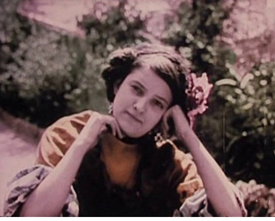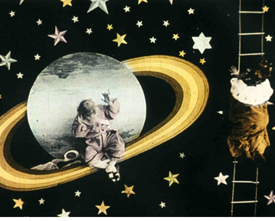SEGUNDO DE CHOMÓN (1903-1912): EL CINE DE LA FANTASIA
Segundo de Chomón is a key figure in the early years of cinema history, and one whose career has long been overshadowed by his French contemporary, Georges Méliès. The DVD collection SEGUNDO DE CHOMÓN (1903-1912): EL CINE DE LA FANTASIA presents 31 films by “the Spanish Méliès,” revealing a filmmaker of comparable imagination, yet unique artistry. This DVD is accompanied with a 111-page tri-lingual book containing an informative essay by historian Joan M. Minguet Batllori entitled “Segundo de Chomón: Beyond The Cinema of Attractions” as well as credits for each film and the participating archives involved in their restoration.
LES TULIPES (1907)
Segundo de Chomón is, without a doubt, the most international Spanish filmmaker of the silent era at the same time as cinematic language hinted at its hegemony over other popular forms of entertainment, and which continued until the end of the silent era. Chomón worked continuously in two of European cinema’s most important production houses: Pathé Frères in Paris and Itala Films in Turin. He collaborated actively on some legendary films of the silent era, such as CABIRIA (1914) by Giovanni Pastone, and NAPOLÉON (1927) by Abel Gance. Most significantly, beyond the large-scale productions, his name is associated with a genre that is essential to understanding the history of the cinema of that time: trick films and fairy tales, i.e., those films that invited the spectator into a world of fascination.
LE SPECTRE ROUGE (1907)
The director’s wife, Julienne Mathieu most likely pushed him into movies. Mathieu had worked as an actress for the production companies Pathé and Méliès’ own Star Film. When her husband returned from a tour with the Spanish army in 1899, she brought him into contact with the emerging world of cinema. In 1902 he became a concessionary for Pathé in Barcelona, distributing its product in Spanish-speaking countries, and managing a factory for the colouring of Pathé films. For Chomón, this initially meant work as a colorist, tinting film by hand. It was a highly skilled and specialized trade that brought him good wages and steady work from Pathé which shipped films out to his studio in Barcelona. Chomón not only colored the film, he created subtitles and provided distribution to local theaters. He was so good at his job that a 1902 advertisement for BARBA AZUL (BLUEBEARD) promised “the finest example to be presented in Barcelona hand-tinted ex professo by the reputable film colorist Don Segundo de Chomón”—a commendation that’s especially noteworthy, as colorists were hardly considered star attractions at the time.
Pathé clearly understood Chomón’s unique talents. He began shooting actuality films of Spanish locations for the company. In 1905, the company offered him a promotion in their main office in Paris, a job that would allow him to work consistently behind the camera. Chomón had directed movies before this move, but he would create his best-known work over the ensuing decade, including THE FROG and creative, futuristic shorts like A TRIP TO JUPITER and THE ELECTRIC HOTEL. The body of work he created over five years was outstanding. Films such as LE SPECTRE ROUGE, KIRIKI – ACROBATES JAPONAIS, LE VOLEUR INVISIBLE and UNE EXCURSION INCOHÉRENTE are among the most imaginative and technically accomplished of their era.
Chomón created fantastical narratives embellished with ingenious effects, gorgeous colour, innovative hand-drawn and puppet animation, tricks of the eye that surprise and delight, and startling turns of surreal imagination (see, for example, the worms that crawl out of a chocolate cake in UNE EXCURSION INCOHÉRENTE, one of a number of films where visitors or tourists are beset by nightmarish haunted buildings, a favourite de Chomón theme).
Chomón made sometimes nightmarish trick films that experimented with color and temporality, and would eventually influence the surrealist work of filmmakers Luis Buñuel and Salvador Dalí, making him, in many ways, the father of Spanish cinema. Buñuel and Dalí organized the first “cine-club,” or film society, in Madrid as college students in the 1920s, leaving little doubt about their familiarity with the internationally renowned Chomón, who was still making movies at the time. Buñuel, Dalí, and Chomón seemed to share a disregard for realism and conventional narrative form, surprising the viewer with unexpected images that could disrupt or disturb. It was their tableaus, more than their stories, that lingered.
SEGUNDO DE CHOMÓN
Contents
Format: DVD-PAL / Region 0
(No Regional Code); DVD/DSL Bundle
----------------------------------------------------------
SEGUNDO DE CHOMÓN (1903-1912): EL CINE DE LA FANTASIA
(Spain, 1903-1912)
Director: Segundo de Chomón
_________________________________________
LOS HÉROES DEL SITIO DE ZARAGOZA
(Spain, 1903)
• 3:25 minutes
◊
L’HEREU DE CAN PRUNA
(Spain, 1904)
• 6:14 minutes
◊
BARCELONE – PARC AU CRÉPUSCULE
Pathé Frères, no. 1124
(France, 1904)
• 1:56 minutes
◊
LE ROI DES DOLLARS
Pathé Frères, no. 1196
(France, 1905)
• 1:40 minutes
◊
PLONGEUR FANTASTIQUE
Pathé Frères, no. 1270
(France, 1905)
• 1:34
◊
AH! LA BARBE
Pathé Frères, no. 1284
(France, 1905)
• 1:44 minutes
◊
LES CENT TRUCS
Pathé Frères, no. 1449
(France, 1906)
• 2:51 minutes
◊
LE COURANT ÉLECTRIQUE
Pathé Frères, no. 1515
(France, 1906)
• 1:18 minutes
◊
L’ANTRE DE LA SORCIÈRE
Pathé Frères, no. 1519
(France, 1906)
• 5:23 minutes
◊
LE SPECTRE ROUGE
Pathé Frères, no. 1711
(France, 1907)
• 8:56 minutes
◊
LA BOÎTE À CIGARES
Pathé Frères, no. 1572
(France, 1907)
• 4:06 minutes
◊
LES OEUFS DE PÂQUES
Pathé Frères, no. 1763
(France, 1907)
• 3:22 minutes
◊
SCULPTEUR EXPRESS
Pathé Frères, no. 1780
(France, 1907)
• 4:32 minutes
◊
LES TULIPES
Pathé Frères, no. 1848
(France, 1907)
• 3:26 minutes
◊
EN AVANT LA MUSIQUE
Pathé Frères, no. 1942
(France, 1907)
• 1:40 minutes
◊
KI RI KI, ACROBATES JAPONAIS
Pathé Frères, no. 1938
(France, 1907)
• 2:33 minutes
◊
LA MAISON ENSORCELÉE
Pathé Frères, no. 1996
(France, 1908)
• 5:54 minutes
◊
LES LUNATIQUES
Pathé Frères, no. 2050
(France, 1908)
• 3:21 minutes
◊
LES PAPILLONS JAPONAIS
Pathé Frères, no. 2116
(France, 1908)
• 3:56 minutes
◊
L’INSAISISSABLE PICKPOCKET
Pathé Frères, no. 2107
(France, 1908)
• 3:48 minutes
◊
CRÉATION DE LA SERPENTINE
Pathé Frères, no. 2255
(France, 1908)
• 5:14 minutes
◊
ELECTRIC HÔTEL
Pathé Frères, no. 2510
(France, 1908)
• 6:27 minutes
◊
LE PETIT POUCET
Pathé Frères, no. 2644
(France, 1909)
• 10:52 minutes
◊
LE VOLEUR INVISIBLE
Pathé Frères, no. 2744
(France, 1909)
• 5:29 minutes
◊
VOYAGE SUR JUPITER
Pathé Frères, no. 2863
(France, 1909)
• 8:04 minutes
◊
LE THÉÂTRE ÉLECTRIQUE DE BOB
Pathé Frères, no. 2950
(France, 1909)
• 5:04 minutes
◊
UNE EXCURSION INCOHÉRENTE
Pathé Frères, no. 3075
(France, 1909)
• 8:11 minutes
◊
GÉRONE, LA VENISE ESPAGNOLE,
Iberico Films for Pathé Frères, no. 5142
(Spain/France, 1912)
• 3:14 minutes
◊
SUPERSTITION ANDALOUSE
Iberico Films for Pathé Frères, no. 5181
(Spain/France, 1912)
• 10:12 minutes
◊
MÉTAMORPHOSES
Iberico Films for Pathé Frères, no. 5221
(Spain/France, 1912)
• 4:37 minutes
◊
BARCELONE. PRINCIPALE VILLE DE LA CATALOGNE
Iberico F. for Pathé F., no. 5368
(Spain/France, 1912)
• 3:14 minutes
_________________________________________
_________________________________________
Total Running Time: 02:25:56
Language: French & Spanish intertitles with English, Spanish & Catalan subtitles and menus
Musical Score: Joan Pineda
Booklet Text: Joan M. Minguet (Trilingual Spanish, Catalan & English)
Published By: Cameo Media & Filmoteca de Catalunya
Institutional Price: $250 (plus shipping); $500 DVD/DSL bundle (plus shipping)
To order call: 212.280.8654 or click here for information on ordering by fax, e-mail or post.







